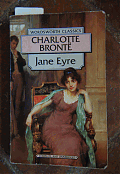
Charolotte Brontë
Jane Eyre
It must have been Mr. Dummer who assigned Jane Eyre in high school. I remember the Bantam Classics cover, a painting of an obscure girl wearing a dark dress sitting in the dark. I remember an image within the book that I must have made up: the shadowy girl of the cover looking out of the third story window of Thornfield over the snow. And the only scene I remembered with any accuracy was the one in the garden where Mr. Rochester proposes. I do remember liking the book a lot, and that it mystified me; I understood that Jane wasn’t a common character, but her actions confounded me.
When I began to reread Jane Eyre I thought I would somehow get into communion with the me that read Jane Eyre years ago. But nothing of the sort happened. Instead it was as if I was reading the novel for the first time. I had forgotten almost everything. What a boon to enjoy a book twice, especially this one.
It’s pretty rare for me to like a book just for its story. A good book balances good writing with a good story, sometimes one raising above the other, but both elements always moving together, in tandem. Jane Eyre, with the exceptions of some Russians, is one of the best stories I’ve ever read, so good that while reading I forgot about the writing—I flipped pages to read ahead, I read the ending before I got there, I was impatient. Jane’s suffering is fascinating, her stalwart acceptance of her place, her lack of self-pity. I often thought back to a quotation of Angela Carter’s printed in my edition’s introduction:
There is a tender embarrassment about re-reading Jane Eyre in middle age; one wants the world to be kind, not to Jane, but to the girl who invented Jane, and, in doing so, set out so vividly her hopes and fears and longings on the page.
Who was Charlotte Brontë? I found myself questioning continuously. A woman who died in her thirties, who had two talented sisters, who was ugly and often severe. Was her life as daunting as Jane’s, her obstacles as high? And did she surpass them with the same stolidness as Jane, passionate, passive, and proud? Charlotte wasn’t Jane and Jane wasn’t Charlotte, so I’ve got to seek my answers elsewhere.
For now, I’m melting, my mind is lagging with little more to write. Anyway, I want to make Jane Eyre an annual tradition, so I’ll be revisiting it, maybe in cooler weather, with more to say.
· · · · · · · · · · · · · · · · · · · ·